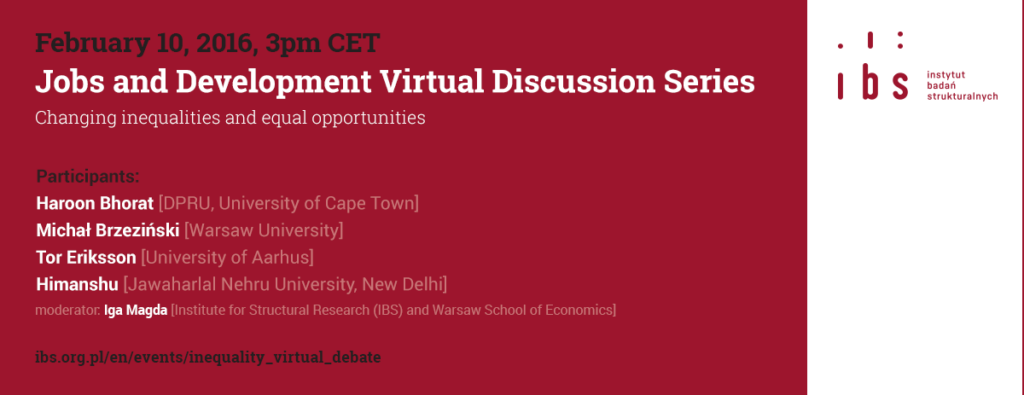
The impact of economic growth on inequality is far from clear. In the recent decades, several countries have recorded continuous GDP growth, but inequalities have decreased in only some of them, while in others, growth has disproportionally benefited higher income groups. At the same time, inequality of opportunity accounts for an important part of the overall income inequalities, meaning that individual parental background determines current health, incomes or labour market outcomes. These developments raise economic, social and political concerns. Therefore the participants of this Google Hangout discussed the following issues:
- Did the economic growth in recent years lower income inequality? What is the evidence from different parts of the world?
- How do changes in income inequality translate into inequality of opportunity?
- What is the role of education in equalizing opportunities and increasing social mobility ? What other factors play a role? Is education equally important in developed and developing countries?
- How can one fairly and justly promote equal opportunity?
- What are the knowledge gaps in our understanding of unequal opportunities?
video conference
participants
Haroon Bhorat, University of Cape Town Haroon Bhorat is the Director of the Development Policy Research Unit, and Professor of Economics at the University of Cape Town. His research interests cover labour economics, poverty and income distribution. He has co-authored two books on labour market and poverty issues in South Africa. Prof Bhorat holds the prestigious National Research Chair under the theme of Economic Growth, Poverty and Inequality: Exploring the Interactions for South Africa. Among his many affiliations, prof. Bhorat is a member of the World Bank’s Advisory Board of the Commission on Global Poverty and was previously a member of the UN Commission on Legal Empowerment of the Poor (LEP). He has also undertaken extensive work for several South African government departments and served on a number of government research advisory panels.
Michał Brzeziński, University of Warsaw Michał Brzeziński is Assistant Professor of Economics at the University of Warsaw. His research interests cover distribution of income, consumption, wealth, health, happiness and other correlates of well-being. His works rely on empirical modelling and also consider the inequality of opportunity and the effects of economic transformation of post-socialist countries on income distribution. He is currently conducting research projects on inequality of happiness and health, parametric modelling of income distribution and inequality and poverty in Poland and other CEE countries. He has previously consulted for World Bank and is a member of the Society for the Study of Economic Inequality and American Economic Association.
Tor Eriksson, University of Aarhus Tor Eriksson is Professor of Economics at the Aarhus University. His research interests cover labour economics, intergenerational mobility, health and also experimental economics. He has contributed to many books on wage structures and published many articles with a particular focus on personnel economics and wage differentials. He is, among other affiliations, a member of working group in Personnel Economics at National Bureau of Economic Research (NBER) and of Nordic Center of Excellence: Empirical Labour Economics. His recent work considers intergenerational mobility, within-firm gender wage gap in Denmark and sorting and wage inequality in the Czech Republic.
Himanshu, Jawaharlal Nehru University Himanshu is Associate Professor in Economics at Jawaharlal Nehru University. His areas of research include issues related to poverty, inequality, employment, food security and agrarian change. Most recent of his numerous research articles revolve around measurement of poverty and inequality in India. Prof. Himanshu has been involved with various government committees including Expert Group on Measurement of Poverty (Tendulkar committee), National Statistical Commission and Ministry of Rural Development. Himanshu writes a fortnightly column on issues related to development in MINT. He is also evaluating the National Rural Employment Guarantee Act and is currently involved in international and multi-disciplinary research projects.
Iga Magda (chair), Institute for Structural Research (IBS) and Warsaw School of Economics Iga Magda, PhD (Economics). Vice President of the Management Board at the Institute for Structural Research (IBS, Warsaw) and Assistant Professor at the Warsaw School of Economics. Previously she worked at the Ministry of Labour and Social Policy, coordinating research projects and participating in EU/ OECD working parties on employment and social affairs. Her research is focused on the labour market (including wage and income inequalities), education and social policy. She has authored and co-authored numerous publications in these fields.

